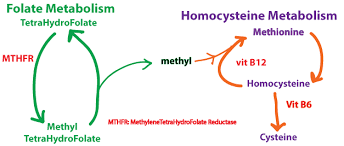Methylenetetrahydrofolate Reductase (MTHFR) – That is a mouthful. My introduction to genetics was when I did my first research paper while in 8th grade. (I was definitely a nerdy kid!) I remember reading about all the health problems genetics was going to solve. While in college, I majored in molecular biology. I quickly learned genetics is far more complex than I had imagined as an 8th grader. Here it is many years later and we all still want genetics to solve devastating health problems. It is now even feasible to get lab tests to learn what gene variations we have.
But I have to acknowledge there is a huge leap going from a specific gene/gene mutation to a certain clinical issue. Our DNA is a blueprint. There are many more steps that are needed to execute the blueprint or express the gene. Epigenetics is the science of how genes are expressed or not.
According to Genetics Home Reference, a service of the National Library of Medicine, the MTHFR gene provides instructions for making an enzyme. This particular enzyme is important for a chemical reaction involving forms of the vitamin folate (also called vitamin B9), a reaction required for the multistep process that converts the amino acid homocysteine to another amino acid, methionine. The body uses methionine to make proteins and other important compounds.
There are two common MTHFR mutations, known as C677T and A1298C. About 1/3 of Americans have one copy of the C677T mutation, but having one copy of C677T or one copy of A1298C is not associated with significant health risks. Likewise, having two copies of A1298C is not associated with significant health risks. However, people with two copies of the C677T mutation (about 11% of people in the US), as well as people who have one copy of both the mutations, have an increased risk for cardiovascular conditions including coronary artery disease, blood clots, depression, and stroke.
So just because you have a genetic variation of the MTHFR gene it does not mean you should take big doses of L-5-MTHF. Starting low and going slow with the addition of any nutrient or medication. There is beginning evidence that over therapeutic levels of certain nutrients may have unintended negative consequences.

_____________________________________________________
Dr. Laurie Goldman is a medical doctor, psychiatrist, and functional medicine practitioner who’s been in private practice since 1999. She founded Clear Path Wellness to help her patients reach their maximum state of mental and physical health using a personalized, comprehensive approach powered by the principles of functional medicine, which treats the whole person, not just symptoms.
About Clear Path Wellness | Services | Contact

